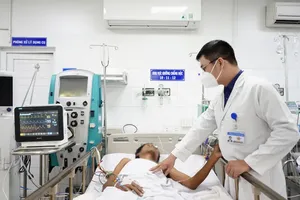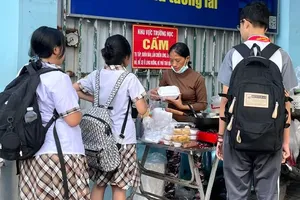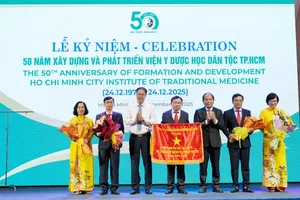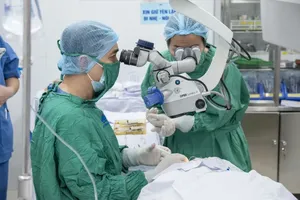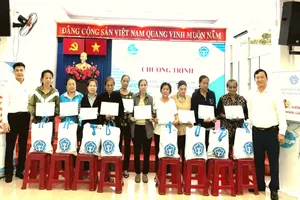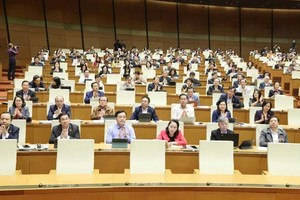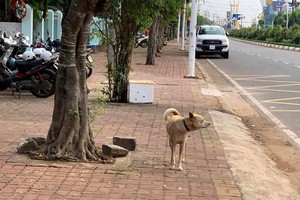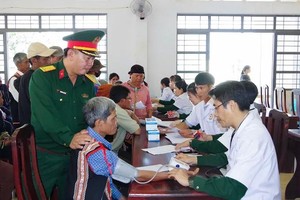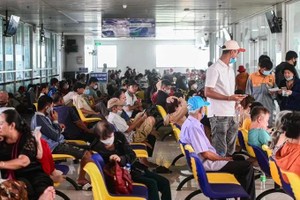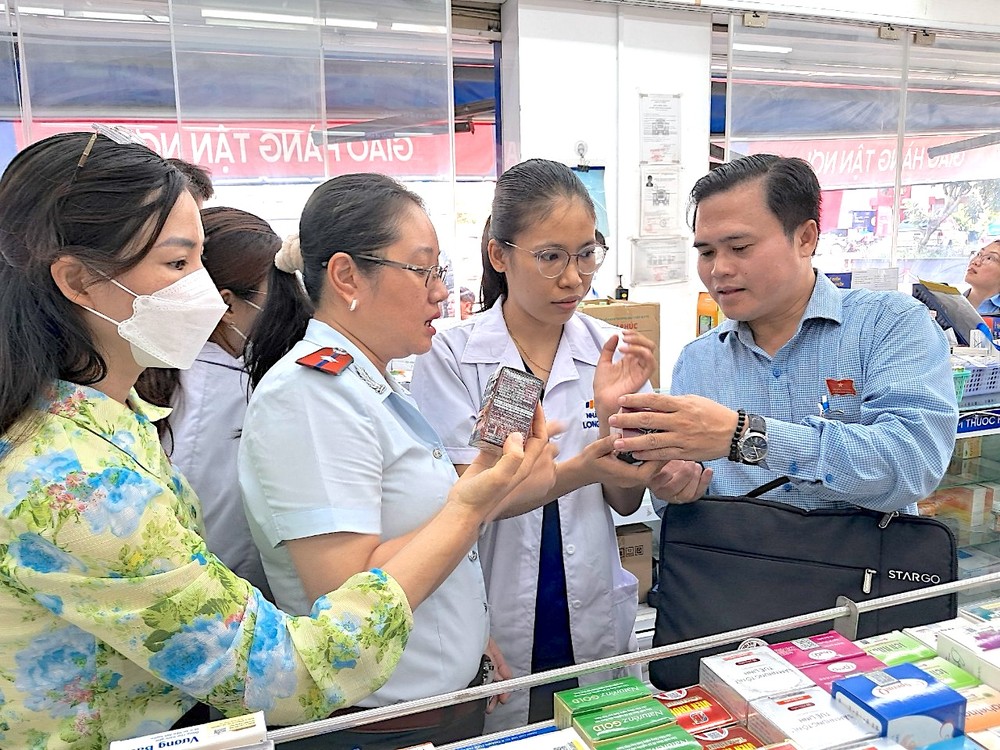
The Standing Committee of the Ho Chi Minh City People's Council yesterday afternoon organized a briefing session on the management and use of drugs at medical facilities and drugstores in the city presided over by Chairwoman of the Municipal People's Council Nguyen Thi Le.
In her opening remarks, Chairwoman Nguyen Thi Le emphasized that the role of drugs in the care and protection of people's health has always been of special concern to the Party and authorities at all levels. The Party and State have always focused on the leadership and direction of the work, issuing policies and strategies to care for people's health, considering people's health to be the responsibility of all sectors and organizations, and the responsibility and vital interests of each citizen as concretized in the Party's resolutions on protecting, caring for and improving people's health in the new situation.
Based on these resolutions, the State has also paid attention to issuing regulations on drug management such as the Law on Drugs in 2016, circulars and instructions on the management of nutritional supplements and the Prime Minister’s Decision No. 1165/QĐ-TTg on approving the National Strategy for the Development of Vietnam's Pharmaceutical Industry to 2030 and Vision to 2045, Ms. Nguyen Thi Le said.
However, she noted the management and use of drugs at medical facilities and drugstores in the city over the past time still has many shortcomings and inadequacies, not keeping up with the reality and city dwellers’ needs according to feedback from local inhabitants and as a recent survey by the Department of Culture - Social Affairs of the HCMC People's Council.
Due to these shortcomings, Ms. Nguyen Thi Le said, the briefing session was organized to assess the implementation of legal regulations, as well as the actual situation of drug management and use at medical facilities and drugstores in the city to clarify what has been done, what has not been done, the advantages, difficulties, and obstacles, and to analyze in depth the causes of limitations in the implementation process. Afterwards, responsible agencies will have proposals, solutions and mechanisms to improve the effectiveness of drug management and use at medical facilities and drugstores in the city.
From that, the Chairwoman of the HCMC People's Council requested brief participants to focus on discussing, analyzing, and assessing the actual situation of drug management and use at medical facilities and drugstores in the city, especially in the post-Covid-19 pandemic period, specifically focusing on the implementation of the direction and issuance of relevant legal documents and guidelines, propaganda, dissemination of information and legal education, state management of drug production and wholesale establishments of medicinal herbs, herbal medicines, traditional medicines, raw materials for drugs, retail establishments comprising drugstores, drug counters, medicine cabinets of commune health stations.
In addition, participants need to focus on discussing the coordination between people's committees in districts, Thu Duc City with departments and relevant agencies in the management and use of drugs at medical facilities and drugstores in the city.
For the HCMC People's Committee, departments, districts, Thu Duc City and related agencies, Ms. Nguyen Thi Le requested to fully explain the contents that participants will raise in today's briefing session, as well as the issues that the city's voters are interested in through the survey of the Department of Culture - Social Affairs of the HCMC People's Council.
According to the report presented at the briefing session by Director of the Ho Chi Minh City Department of Health Tang Chi Thuong, the city's healthcare system comprises a diverse range of medical facilities.
The city's healthcare facilities are large-scale and multi-disciplinary as the final referral center for the Southern region. Specifically, the city currently has 10 general hospitals (with 8,400 beds), 22 specialized hospitals (with 13,385 beds), 12 ministerial and sectoral hospitals, including specialized hospitals of the Ministry of Health and the Ministry of Defense (with 7,055 beds), 19 hospitals and 4 medical centers in districts and Thu Duc City (with 5,377 beds), 67 private hospitals (with 5,794 beds), 328 health stations, around 8,044 private clinics, and 39 satellite emergency stations.
Additionally, the number of doctors per 10,000 people in 2023 reached 20.6 doctors (an increase compared to 2022 and nearly reaching the 2025 plan of 21 doctors/10,000 people); the number of hospital beds per 10,000 people in 2023 reached 41.2 beds (a decrease compared to 2022) and nearly reached the 2025 plan of 42 beds.
Despite the impact of the Covid-19 pandemic, which caused the number of outpatient and inpatient visits to decrease from 2020 to 2022 compared to the pre-pandemic period, in 2022, the number of outpatients and inpatients reached over 34.5 million, the majority of whom were patients from other provinces and cities.
In 2023 alone, the number of outpatients and inpatients reached over 38.5 million, of which about 20 million were covered by health insurance in Ho Chi Minh City out of a total of 175 million nationwide. The total cost of health insurance treatment in the city in 2023 was VND 27,395 billion (over US$1 billion), of which the cost of health insurance drugs was over VND 11,000 billion.
Regarding the drug distribution system in the city, the Director of the Ho Chi Minh City Department of Health said that there are 43 drug manufacturing factories; 1,512 businesses and facilities wholesaling drugs and pharmaceutical raw materials; 16 facilities for medicinal herbs, traditional medicine, and herbal medicine; and 8,387 pharmacies. The volume of drugs consumed in Ho Chi Minh City accounts for only 25 percent to 30 percent of that of the country. Therefore, efficient supply for the demand of treatment is a challenge, requiring great efforts from the city's pharmaceutical industry.
To ensure the procurement and adequate supply of drugs and medical supplies to public medical facilities, the Director believed that the city has an advantage in having 43 pharmaceutical manufacturing factories on its territory, accounting for about 15 percent of the total number of factories in the country, including factories that meet GMP-WHO standards.
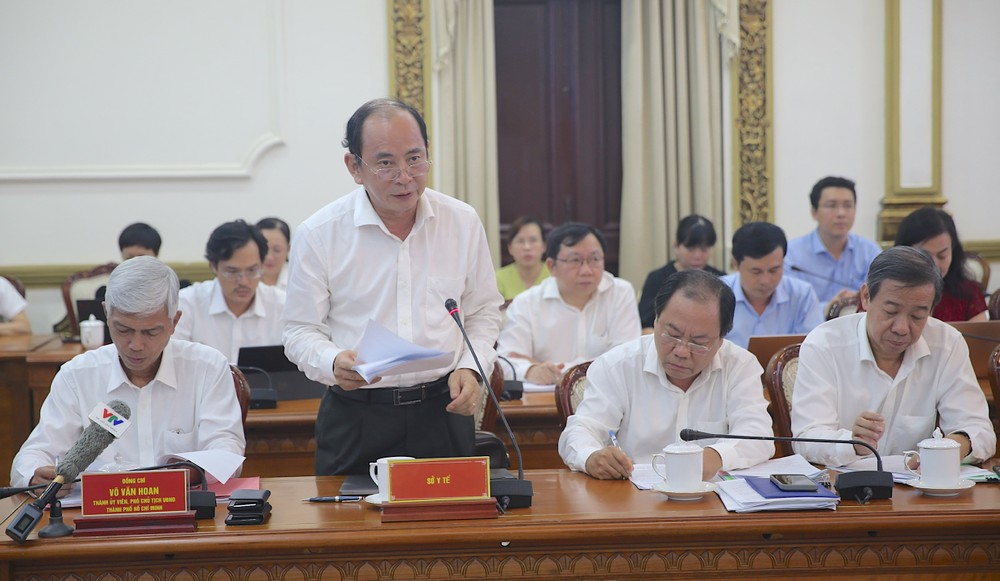
Drug bidding is strictly managed and follows the regulations closely. Specifically, for the local-level centralized procurement package, in 2022, the Ho Chi Minh City People's Committee assigned Hung Vuong Hospital to implement it and the results of selecting contractors were available in the first quarter of 2023.
Roughly 278 out of 315 bid items were awarded; the total contract value was over VND 1,480 billion (the total bid value was nearly VND 1,619 billion). For the 37 bid items that were not awarded in the local-level centralized procurement package, public medical facilities conducted individual bidding.
In addition, in 2023, the Ho Chi Minh City Department of Health also supervised the bidding work of 4 units, including Tu Du Hospital, Dermatology Hospital, An Binh Hospital and District 3 Medical Center.
To further improve the management and use of drugs at medical facilities and drugstores in the city, Director Tang Chi Thuong proposed that the National Assembly soon approve the law amending and supplementing the Law on Drugs, in which it is necessary to supplement drug business forms in line with the actual development of socio-economic conditions (drug business in the form of e-commerce, drug transportation service business); amend the regulations on drug registration procedures to shorten the time for granting drug registration certificates for newly registered drugs, in the direction of referring to the results of the evaluation and granting circulation permits of tightly controlled a stringent regulatory authority (SRA); amend the regulations on automatic renewal of drug registration numbers if the drugs ensure safety and efficacy during circulation and there are no reports of serious adverse reactions.
Dr. Tang Chi Thuong also proposed amending the regulations on the registration of traditional medicines, prioritizing the reduction of dossiers proving the origin and clinical efficacy of medicines for medicines produced based on traditional formulas that have been proven to be effective in practice or medicines with a long history of business, ensuring safety and efficacy while issuing preferential policies to develop traditional medicine to promote and inherit valuable medicines (regulations on trademark registration, intellectual property rights).
What’s more, he suggested that the Government should consider amending and supplementing a number of articles of its Decree 117/2020/ND-CP on administrative penalties in the field of health to be in line with the actual situation and current legal regulations. In addition, he wanted the government to soon approve the project of the Specialized Medical and Pharmaceutical Industrial Park in Ho Chi Minh City into the List of key investment projects as stipulated in the Prime Minister’s Decision 376/QD-TTg and issue special support policies from the Government, the Ministry of Health to promote and create conditions for businesses to bring products to the market as soon as possible, serving the supply of high-quality drugs to meet treatment needs.
Last but not least, he expected that the Ministry of Health should soon issue a circular to replace Circular 15/2011/TT-BYT on the operation of drug retail establishments in hospitals, the Circular 23/2011/TT-BYT guiding the use of drugs in medical facilities with beds, the Circular 22/2011/TT-BYT on the operation of the hospital pharmacy department to update in accordance with current regulations. He voiced his opinion that Vietnam Social Insurance should amend the regulations on payment of drugs for health insurance cardholders by calculating fully the costs arising in the process of procurement, storage and distribution of drugs at medical facilities.
